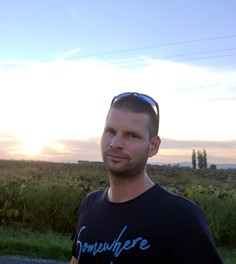Interview with Miklós Rapali (electrical engineer, network engineer, mechatronic engineer)
“I have learned to learn, to be open to new things and to look at a problem from more than one point of view.”
An interview with Miklós Rapali, an electrical engineer who was one of the first graduates of our MSc in Mechatronics Engineering (from Harman Becker Ltd. Harman Becker)
(Part eleven of the alumni interview series)

- What was your motivation for choosing our university or its predecessor institutions?
I went to high school at the Széchenyi István MSZKI, majoring in electronics and electrical engineering, and I had already heard a lot of good things about the Kandó Kálmán electrical engineering course, so it was a no-brainer for me to choose the faculty in Fehérvár.
- Exactly which predecessor institution did you study at? Which degree(s) did you obtain?
I studied electrical engineering (BSc) at the BMF centre in Fehérvár, then obtained a Network Engineering qualification in its successor, and then graduated as a first-year student from MSc Mechatronics Engineering at OE.
- Did you have a teacher you looked up to? What message/perspective/knowledge did he or she enrich you with?
I couldn’t single out or name teachers, because when you start to think about your career so far, you realise that everyone has contributed to the person you are. Whether it should be with their outlook, their knowledge or just their teaching method,
I am very grateful to all the instructors I have been associated with for doing and have done so much for the students.
- Can you recall your first memory of university?
My earliest memory is about the enrolment, when 126 eager young people sat in the large lecture theatre downstairs hoping to become electrical engineers of the future.
- Did the institution give you a life-long passport?
I have learned to learn, be open to new ideas and look at a problem from more than one point of view.
- Can you describe what you loved most about the university?
The family atmosphere. On one hand, unfortunately, there quite a few of us leaving after the first semester, which on the other hand meant a lucky situation, a very friendly atmosphere between teachers and students.
- Has anyone else in your family followed your choice of higher education institution?
Yes, I was followed by my brother, who also graduated from electrical engineering.
- What opportunities do you see in higher education today?
A lot! As a middle manager I have experienced talking to recent graduates and I regret the lack of their professional depth. However, the opposite is true for dual training. I support this model to the full as now I have been mentoring a student since her first semester at college. I try to contribute to both her professional and personal development. I can say that dual training has its place in today’s economy, as it allows people to come out of school with marketable skills, with knowledge of new technologies and the ability to work with them. This is where I see the future at the moment, and if it were possible I would propose an even closer link between dual training and jobs.
- Any advice for today’s youth on how to choose a university/career for themselves?
Listen to your heart! This is a profession that should be done with heart. Unfortunately, fewer and fewer electrical engineers are entering the labour market. I can see that this noble profession is disappearing, even though there is a great need for good professionals. If you would like to participate in a family-oriented and truly practice-oriented training, you should include our university (ÓE AMK) on the application form.
- Can you recall a memorable moment that links you to our university?
At this time, people usually only remember the good things. For me, one of my most memorable moments is still linked to a sad event. Unfortunately, Péter Lőrincz, my former director and consultant, died unexpectedly. I would like to commemorate this exceptional man by mentioning his name and by writing these few lines.
- To what extent can you use what you have learned at our institution in your workplace?
Everything has its place. Maybe not on purpose, but every day problems come up where I can use what I’ve learned. The best example for me is the first state exam, when you start learning the topics and it’s a wonderful feeling when you realise where architecture is related to database management, computer networks, peripherals and you could go on. The really good feeling is when you start to think in context.
- Did you want to do this as a child or did you have other “career dreams”?
My father was basically an electrician, but as a matter of fact he could fix all small appliances and electrical devices. Even back then I loved to watch him make something that didn’t work into something that did, so yes, that was my dream.
- With a degree in hand, what were the first few steps you took to further your career?
I was lucky because I had a contract with employment before I took my state exams. Which was only due to the institution. I did a student job at a multinational company which was so amazing. I used this work experience for my thesis, and I was offered a job contract before my final exams. I was really lucky there. Consequently, I fully support dual training because due to such training everybody can have a better chance for entering the job market.
- How would you recommend the Alba Regia University of Technology Óbuda to young people?
Come and learn in a family-like atmosphere, gain marketable skills that will guarantee you a place in the labour market.
